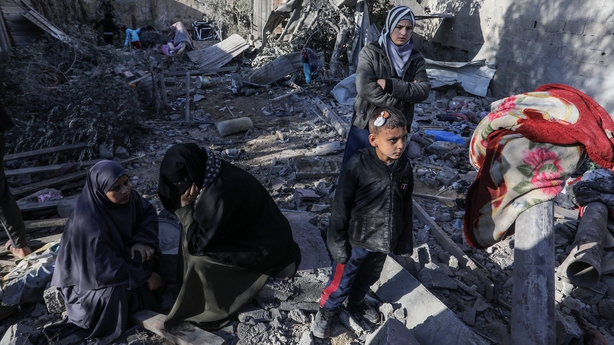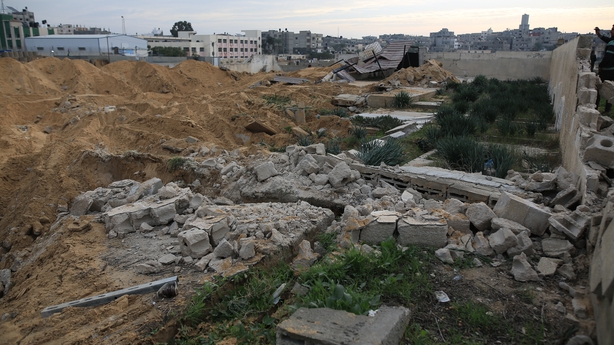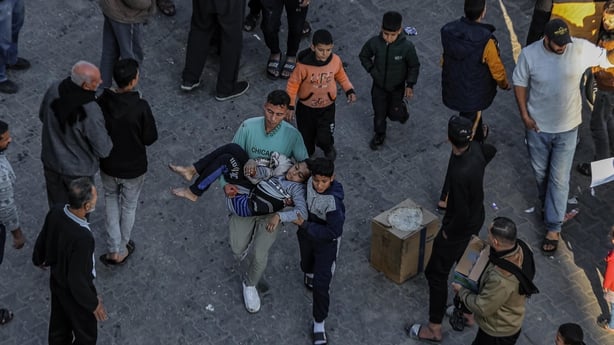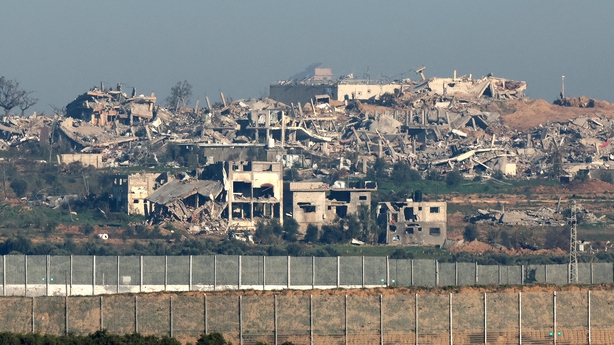Israeli ground troops have killed dozens of militants in "close-quarters combat", the Israeli army said, as it intensified operations in Khan Yunis, south Gaza's biggest city.
In the occupied West Bank, where violence has soared alongside the war in Gaza, an Israeli raid continued into a second day around Tulkarem, an official said.
Palestinian health officials reported a sixth person had been killed in the operation.

"In Khan Yunis, the Givati Brigade is now fighting in the southernmost area that (Israeli) ground troops have operated in so far," the Israeli army said, referring to a unit that had been based in Gaza before Israel's 2005 withdrawal.
"The soldiers eliminated dozens of terrorists in close-quarters combat and with the assistance of tank fire and air support," it said in a statement.
Soldiers raided the "Martyr's Outpost" of Hamas's Khan Yunis brigade and the offices of its commanders, seizing a weapons cache including AK-47 assault rifles and rocket-propelled grenades, it added.
Live footage from AFPTV showed smoke rising over central-southern Gaza in the afternoon.
The Hamas government reported dozens of strikes, including on Khan Yunis and refugee camps in central Gaza.


Gaza's health ministry said 93 people had been killed overnight, including 16 in a strike on a house in the southern city of Rafah, where many people have fled.
Those killed in the Rafah strike included women and children, and 20 people were injured, the ministry said.
A man sat quietly among the rubble, his head bowed, examining a child's glove.
Umm Walid al-Zamli said she lost her children, and her house.
"The eldest was a second-grade girl," she said in a choked voice. "What did they do wrong?"
Fighting has ravaged Gaza since Hamas's unprecedented 7 October attacks on Israel that resulted in the death of about 1,140 people, mostly civilians, according to an AFP tally based on official Israeli figures.
Vowing to destroy Hamas, Israel is conducting relentless bombardment and a ground offensive.
These have killed at least 24,620 Palestinians, around 70% of them women, children and adolescents, according to updated health ministry figures.
Militants seized about 250 hostages during the 7 October attacks, around 132 of whom Israel says remain in Gaza.
At least 27 hostages are believed to have been killed, according to an AFP tally based on Israeli figures.
We need your consent to load this rte-player contentWe use rte-player to manage extra content that can set cookies on your device and collect data about your activity. Please review their details and accept them to load the content.Manage Preferences
Families of the captives have spearheaded a campaign to get them home, pressuring the government which has said their return is one of its war aims.
UN agencies say greater aid access to Gaza is urgently needed, as famine and disease threatens.
Palestinian and Israeli officials confirmed a shipment of aid, including medicine for hostages, had entered Gaza after French and Qatari mediation.
Yesterday, Qatar said the shipment, which also comprises humanitarian aid for Gazan civilians, had reached the territory under an agreement announced on Tuesday.
Two planes had earlier arrived in the Egyptian city of El-Arish near Gaza with 61 tonnes of aid provided by Qatar and France.

The International Committee of the Red Cross said it did not play any role in implementing the deal but welcomed it as "a much-needed moment of relief".
Israeli Defence Minister Yoav Gallant said the army was hitting Khan Yunis particularly hard to dismantle the Hamas leadership, which the army says has already been done in northern Gaza.
Since ground operations began in late October, 193 Israeli soldiers have been killed in Gaza, the military says.
The war has displaced roughly 85% of Gazans, the UN says.
Many have crowded into shelters where they struggle to get food, water, fuel and medical care.
At Israel's Nir Oz kibbutz, Yossi Schneider is clinging to hope for his relative Kfir Bibas, a baby, despite Hamas's announcing his death, along with that of his brother and mother.
The youngest hostage was less than nine months old when militants snatched him from his bed on 7 October. He would be celebrating his first birthday today.
"We are thinking about them every day, every second, every minute," Mr Schneider said.
In the West Bank, violence has escalated to a level not seen since the second Palestinian intifada, or uprising, of 2000-05.
Army raids and attacks by settlers have killed about 360 people in the territory, according to its health ministry.
The losses are also economic. The World Bank has estimated the West Bank's gross domestic product could fall by 6% this year.
The man shot dead in Nur Shams refugee camp, on the edge of Tulkarem, was a civilian not involved in fighting between Israeli forces and militants, local official Remi Elyan told AFP.
Israel's military said troops returned fire while they were working to "uncover roads where explosive devices were planted".
Israeli forces killed ten people in the West Bank yesterday, the ministry and the army said.
Five were killed inside Tulkarem refugee camp, according to the ministry, while Israel's military confirmed an air strike that killed "a number of terrorists" during a raid there.
In the latest incident to unsettle the Middle East, and beyond, Iranian state media said Pakistani strikes on an Iranian border region killed nine people. Pakistan said it had targeted militants.
This followed a rare Iranian air strike, late on Tuesday, which Iranian media said targeted a group which in December claimed the killing of at least 11 Iranian policemen.
Iran's Revolutionary Guards earlier said they had destroyed the "Zionist regime's spy headquarters in the Kurdistan region of Iraq". Tehran also launched attacks on targets in Syria.
European Union spokesman Peter Stano said the series of attacks are of "utmost concern" and have "a destabilising effect on the region".
Israel has exchanged regular cross-border fire with Lebanon's Iran-backed Hezbollah movement since the start of the Israel-Hamas war.
US forces said they conducted a fourth round of strikes on areas of Yemen controlled by Iran-backed Houthi rebels who have disrupted shipping in the Red Sea.
The US military said it struck 14 Houthi missiles that were loaded to be fired.
Read more:
Latest Middle East stories
UN expert says Israel's Gaza offensive breaches international law
Israel has broken international law with its "relentless" bombardment of Gaza that has levelled neighbourhoods and killed thousands of Palestinians, a UN rights expert said Thursday.
The comments by Francesca Albanese, an Italian lawyer who is the UN special rapporteur on the Palestinian territories, came as Israel confronts a case brought by South Africa to the UN's International Court of Justice accusing it of genocide.
"Israel has done a number of things that are highly illegal, highly unlawful," Albanese told a Madrid news conference.
While Israel has the right to self-defence, international humanitarian law must be respected "to protect people who are not actively involved in combat. Civilians, prisoners of war and the sick and wounded," she added.
This meant distinguishing between combatants and civilians and ensuring military attacks are proportionate to avoid excessive harm to civilians, Albanese said.
"Instead what has happened is over 100 days of relentless bombing - the first two weeks using 6,000 bombs per week, bombs of 2,000 pounds, in highly crowded area." she said.
"Most hospitals have been made dysfunctional. A good number of them, the major ones, have been closed, bombed or taken over by the army. People are dying now not only because of the bombs but because there is not sufficient health infrastructure to cure them of wounds.
"The number of kids who get amputated every day is shocking, one or two limbs. During the first two months of this (war) 1,000 kids were amputated without anaesthesia. It is a monstrosity," she added.
Special Rapporteurs are not UN staff but are independent experts named by the UN human rights commission who monitor rights areas.
Albanese said she "firmly condemned" the violence carried out by Hamas, which she said amounted to war crimes and may also be crimes against humanity, but "nothing justifies what Israel has done".
South Africa took its case to the International Court of Justice last week. But it has been fiercely resisted by Israel with support from the United States and other allies.
Israel has insisted its military response was in self-defence after the brutality of the Hamas attacks and that the genocide case is "distorted".
It's representatives have highlighted how the militants also seized about 250 captives on 7 October.
Israel says 132 remain in Gaza, including at least 25 believed to have been killed.

